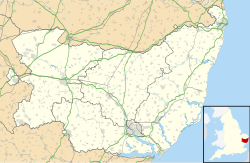RAF Sudbury
| RAF Sudbury USAAF Station 174 |
|
|---|---|
| Sudbury, Suffolk, England | |

Sudbury Airfield - 8 July 1945
|
|
| Coordinates | 52°03′43″N 0°45′22″E / 52.062°N 0.756°E |
| Type | Royal Air Force station |
| Code | SU |
| Site information | |
| Owner | Air Ministry |
| Controlled by |
|
| Site history | |
| Built | 1943 |
| In use | 1944-1945 |
| Battles/wars |
European Theatre of World War II Air Offensive, Europe July 1942 - May 1945 |
| Garrison information | |
| Garrison |
|
| Occupants | 486th Bombardment Group |
Royal Air Force station Sudbury or more simply RAF Sudbury is a former Royal Air Force station located 2 miles (3.2 km) north-east of Sudbury, Suffolk, England.
RAF Sudbury was opened in 1944 and was built to the standard Class A heavy bomber airfield with three intersecting concrete runways of standard lengths with Fifty hardstands and two T2 hangars to meet the USAAF bomber requirements. The airfield had a slight gradient towards the north-east and was constructed on what had been farmland. Most of the temporary building accommodation for some 3,000 men was situated around the village street of Great Waldingfield to the east of the airfield and accessible by crossing the B1115 road from Sudbury to Lavenham. The facility was used by the United States Army Air Forces Eighth Air Force. Sudbury was given USAAF designation Station 174 (SU).
The 486th Bombardment Group (Heavy) arrived from Davis-Monthan AAF, Arizona during March 1944. The 486th was assigned to the 4th Combat Bombardment Wing, and the group tail code initially was a "Square-O". When the group converted from B-24s to B-17s during the summer of 1944, the Group ID was changed to "Square-W", perhaps to avoid confusion with the Square-D on B-17s of the 100th Bomb Group. The 486th was the only group to change its ID.
Its operational squadrons were:
The group flew both the Consolidated B-24 Liberator and the Boeing B-17 Flying Fortress as part of the Eighth Air Force's strategic bombing campaign and operated chiefly against strategic objectives in Germany until May 1945. Targets included marshalling yards in Stuttgart, Cologne, and Mainz; airfields in Kassel and Münster; oil refineries and storage plants in Merseburg, Dollbergen, and Hamburg; harbours in Bremen and Kiel; and factories in Mannheim and Weimar.
...
Wikipedia


